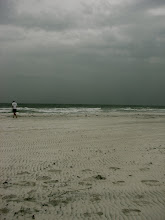In 1983--May--Brock, Matt and I drove to Alaska. We left Iowa and headed to Seattle and then north. We went up through British Columbia, splitting off to the lesser used coastal highway at Prince George, rather than heading up to the main route--the AlCan. We camped all the way, making it into the Yukon, spending a night in Whitehorse where we paid $3 each to take showers in a trailer rigged out for just such a purpose. Then we head to Alaska, a return to the U.S. Border.
And that's where we were stopped.
Crossing into Canada had been no big deal--a simple and friendly encounter--but returning into the U.S (our home country) we were stopped, grilled, dog-sniffed. I know that when I pulled up (I was driving) I was happy, we were all in a good mood--Alaska at last!--jubilant. So, maybe I came off as flippant or something when we pulled up. But we were only just happy young men on a long road trip to work the summer in Alaska. Anyway, they made us pull to the side and get out of the car.
Now, we had no drugs on us. Well, Brock and I had none. Matt also had none, but he had had some (he later told us) on the trip. All three of us smoked pot but Matt did more often. In fact, we basically smoked Matt's pot in Iowa City. Brock and I had no idea he had brought some along on the trip. And the thing was, he had finished it up by the time we hit the Yukon. Still, he had a pipe with residue and there were a number of seeds in his car.
Matt answered all questions and showed the agent what and where his paraphernalia was; Brock and I just honestly said we had nothing. This was all news to us. But they wanted to know what else we had, where the cocaine was and so on.
So, off we went inside. Detained. Questioned again. Eventually we sat in an waiting room, with an official at a desk, while outside they started to go through our stuff and the car. I looked at my two friends and said, somewhat loud but also sincerely: "This is a big waste of time."
I don't know if that did the trick or not, but the official got up and went outside. Just a moment later he came back in and told us we could go.
When, later that summer, we crossed back into the Yukon, the Mountie smiled, told us to have a good day, and waved us right through.
Now, in 1990, I was coming back from Mexico to Montana by bus. By myself. I'd met some men on the bus--Mexicans--who joked around with in my limited Spanish, but also met a Canadian guy (a Saskatchewan, I think) who had a dark tan and very black hair and thick mustache. He looked more like your stereotypical Mexican than the Mexicans did.
Well, up north--not quite at the border--the bus came to a stop. At this stop, a group of men--Federales--with machine guns came onto the bus. They made every male get off the bus. We stood outside and then they herded us into a tin shack that had no windows. There was a chief--a small man--and about three or four others (the ones with the machine guns). They lined us up inside that shack and then had us come forward one by one while the Jefe checked our papers.
My Saskatchewan buddy was before me. The chief started to talk to him in Spanish. I knew more Spanish than this guy and he couldn't answer the man. And the man got agitated and spoke louder, faster, angrier and the Canadian could only put up his hands. I almost spoke out, to say he wasn't from Mexico, but figured maybe that wasn't a good idea. Eventually they got it straightened out.
When my turn came, he looked at my papers and my license. (I may have had my passport with me--but I had gone to the trouble to get a permit to travel in Mexico when I was in Tijuana--a visa of some sort that was required but that few people ever bothered to get. A German girl got detained for lack of one when we got off the ferry in Mazatlan.) "From the United Staes, eh?" he said in English. Or maybe he said "Americano", I'm not really sure. And I just said, "Yes."
That was it. Nothing more. I do recall at least one local man from the bus giving the Federales a hard time. I don't know what was said, exactly, but it was sort of a protest to their detaining us and taking us into a room like that. And it was kind of scary--though I don't recall thinking to ominously about it when it happened. It's more common to see authorities dressed in tactical gear and carrying machine guns now than it was in 1990. So, there was a bit of a shock factor, but, fortunately, nothing really happened.
At the U.S. Border in Nogales there was no problem, except the Canadian had to pour out a full bottle of rum. In Canada, you can bring back two or three bottles of alcohol from Mexico. United States citizens were only allowed to bring one.
